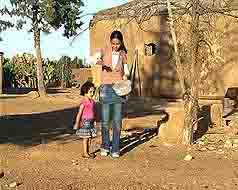 |
|
|
|
|
|
|
Ch.6 - Using ICT WEBQUEST
1: |
|
|
What places would you like to visit? |
|
|
|
These are some of the websites we found useful, but the list is not exhaustive. Make sure you look at both French and English sites, and Arabic if you can manage that language too! |
||
|
www.visitmorocco.org is primarily a publicity and
tourist site but has some very interesting information and
photos. Children might like to plan their own imaginary trip
around the country, highlighting places of particular
interest. http://en.wikipedia.org/wiki/Morocco
gives
lots of facts about the country, and opportunities to
investigate further the key headings. The contrast between
the traditional rural life and the Technopark in Casablanca
illustrate the diversity of the country and its people www.morocco.com
is a publicity/tourism site but has a lot of information
which can be selected, e.g. wedding traditions, festivals,
climate, history, proverbs etc http://news.bbc.co.uk/1/hi/world/middle_east/country_profiles/791867.stm
gives some facts and figures as well as links to other
information www.geographia.com/morocco/
gives some simple information about geography and has some
interesting photos http://www.kwintessential.co.uk/resources/global-etiquette/morocco-country-profile.html
gives information about customs and etiquette, for example
removing shoes on entering a house, table manners. It could
be fun to ask children to investigate these areas and then
to set up simple role plays to share the customs with the
class. www.bugbog.com/maps/africa/morocco_map.html
has simple texts and some good photos, as well as the maps http://www.fco.gov.uk/en/about-the-fco/country-profiles/middle-east-north-africa/morocco/
is aimed more at the business traveller but could be useful
for teachers rather than pupils http://www.mincom.gov.ma/mincom/AR
is a site in Arabic for the Ministry of Communication, and
it gives news in Arabic, which could be compared to British
news sites http://royalairmaroc.com
site gives children the opportunity to plan a trip to
Morocco and to ‘book’
flights on line (as long as they don’t
type in your credit card number and press Accept!) http://berberadventures.com
site has some wonderful photos of the High Atlas mountains
and Berber villages, quite a contrast form the big cities of
Morocco. http://www.maroc.net/
is in both French and English and gives information on a
range of topics including national sports teams, museums
with virtual tours, traditional costumes etc. It also allows
you to listen to an up-to-date news broadcast on line. http://www.maroc.ma
is accessible in French, English, Spanish & Arabic, and
although aimed predominantly at adults, business people and
investors, it would be interesting to allow your children to
switch between the information in different languages. |
||
|
|
|
|
http://www.bbc.co.uk/weather/5day.shtml?world=1370
allows them to look at the current weather and the forecast
in the main towns in Morocco. This could provide the basis
for a wonderful display, comparing with England, or also a
simulated news item, announcing the weather, temperature etc
in French. http://www.timeanddate.com/worldclock/city.html?n=206
gives the local time in Rabat, the capital of Morocco and
can be changed to any city. It would allow your children to
talk about time zones, as well as weather and telling the
time. |
|
|
|
|
The 3 websites below have some delicious and relatively simple recipes. The salads could be prepared in school without using ovens, and some children might like to try out main course recipes at home. It might even be possible to persuade the school catering staff to provide a Moroccan-style meal as part of a themed event. |
|
|
WEBQUEST 4: |
|
http://www.youtube.com/watch?v=ViYTcc6t-fY
There are several you tube entries for example for
Khemisset, which was the town linked to York primary schools
in a recent project, and of course it is important that you
check the entries on you tube before letting your class lose
on these home-made videos! |
|
|
|
|
http://www.britishcouncil.org/morocco-education-partners-uk.htm
tells you about some of the UK/Morocco school projects, and
how the British Council is involved in these. |
|
||||||

